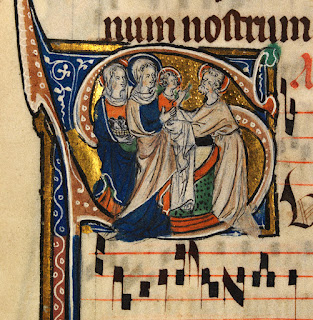Opening Voluntary Four
Variations on The Glory of These Forty Days
(Erhalt
uns, Herr)
setting,
Jacob B. Weber
Think
of today’s prelude as a preview of the Gathering Hymn. Paul Westermeyer, one of
the leading experts on Lutheran hymnody calls Erhalt uns, Herr one of
our “sturdies and most durable” tunes – and he’s right! Bold registrations signal
our readiness for the Lenten journey – the third variation is even marked “March-like.”
Gathering Hymn The Glory of These Forty Days (Erhalt uns, Herr)
 |
| Looking for a community to walk with you on the Lenten journey? Look for a cross draped with a purple cloth. You are welcome at St. Mark's! |
Evangelical
Lutheran Worship 320
We
don’t often hear of people fasting during the Lenten season, but if you are
looking for examples to model your fast on, there are several here – first Jesus
himself, then Moses, Elijah, and Daniel.
We don’t know who authored the text of this hymn, but Christians have been singing since at least the 11th century.
We don’t know who authored the text of this hymn, but Christians have been singing since at least the 11th century.
Hymn of the Day A Mighty Fortress Is Our God (Ein feste Burg)
ELW
505
If
you’ve been waiting for the chance to sing this favorite hymn in the isometric pattern, then you don’t want to miss church this Sunday! We also sing
the rhythmic version at St. Mark’s which is closer to the version that Martin
Luther wrote. The move from the rhythmic version to the isometric one took a
couple of centuries – and Lutheran chorales weren’t the only victims, it also
happened to psalm tunes from the Calvinist tradition.
Many
people like to call the version that we sing today the “traditional version,”
but it’s a fact that it doesn’t show up in print until 200 years after the
Reformation began.
This
video shows the difference between the two. First hear the rhythmic version,
melody only, played by a solo trumpet. Second, hear the four-part version
played on the organ’s principal stops. Incidentally, the trumpet you hear is
the one from the original 1984 Zimmer organ, a gift to St. Mark’s by Lydia
Kreuger.
Musical
Offering (sung by the Festival Choir) Lord, Who Throughout These Forty Days
Linda
Cable Schute
The
composer borrowed an English folk tune (The Turtle Dove) and paired it
with a text by Claudia Frances Hernaman (1838-1898), author of more than 150
hymns, many of which she wrote for children. “The Turtle Dove” gives her
composition the feel of a traditional hymn. The second verse features tenors
and basses singing the melody while the sopranos and altos provide a gentle
counter melody. Like much of the music in today’s service, the concluding
statement asks Jesus to “abide with us” as we journey through the season of
Lent.
Communion Hymns
I Want Jesus to
Walk with Me (Sojourner) ELW 325
Lord Jesus, You
Shall Be My Song (Les Petites Soeurs) ELW 808
Sending Hymn Praise and Thanks and Adoration (Freu dich
sehr)
ELW 783
Closing Voluntary A Mighty Fortress Is Our God (Ein feste
Burg)
Johann Pachelbel
(1653-1706)
The Windows at St. Mark’s
The top graphic and the
video show some of the stained-glass windows from St. Mark’s. Our windows came
from Nobis Studios in Oakland, Florida. They are made in the “faceted-glass” style
which dates to the Middle Ages when chunks of glass were embedded in cement.
The materials have changed, but the beauty of the original style has been
retained.
Do you like to sing?
New voices are always welcome in the Festival Choir! Each Sunday we lead the hymns and sung portions of the liturgy in addition to preparing a special musical offering. For more information, contact Tony Cruz or any choir member.
Sources: Wikipedia
Hymnal Companion to Evangelical Lutheran Worship edited by Paul Westermeyer, published by Augsburg Fortress
Do you like to sing?
New voices are always welcome in the Festival Choir! Each Sunday we lead the hymns and sung portions of the liturgy in addition to preparing a special musical offering. For more information, contact Tony Cruz or any choir member.
Sources: Wikipedia
Hymnal Companion to Evangelical Lutheran Worship edited by Paul Westermeyer, published by Augsburg Fortress



